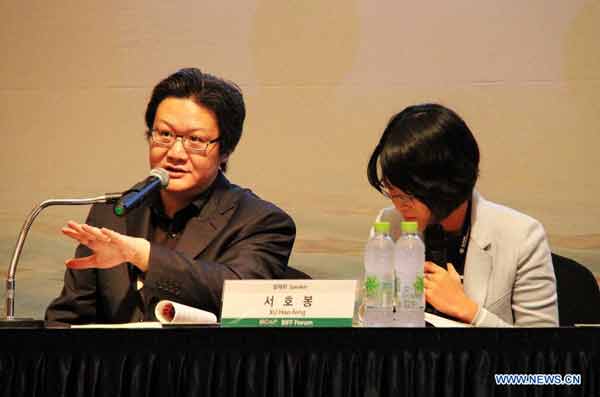 |
| Xu Haofeng (L), professor of Beijing Film Academy, speaks during the "The Martial Art Film in China" session of 2013 Busan International Film Festival Forum, in Busan, South Korea, Oct. 9, 2013. Xu Said that the unique storytelling, the exploring of the spirit of martial arts and the respect for motion patterns are panaceas for Chinese martial arts films to break its current bottleneck. (Xinhua/Peng Qian) |
BUSAN, Oct. 10 -- The unique storytelling, the exploring of the spirit of martial arts and the respect for motion patterns are panaceas for Chinese martial arts films to break its current bottleneck, said Xu Haofeng, professor of Beijing Film Academy.
Xu, also the martial arts adviser and scriptwriter of the film "The Grandmasters" directed by Wang Jiawei, made the remarks on Tuesday during the "The Martial Art Film in China" session of 2013 Busan International Film Festival Forum. "The martial arts became nothing particular worldwide. Chinese martial arts films are facing with threatens from Hollywood," said Xu, adding that Hollywood has seen a surge of China's Hong Kong's choreography directors who are responsible for action sequences since 1990's. They have trained a generation of professional local choreography directors, especially African Americans.
As a result, western films have already adopted the techniques of China's Hong Kong and China's Taiwan martial arts movies successfully and applied them in films such as the series of " Sherlock Homes", "The Twilight Saga" and "Kung Fu Panda". Xu graduated from China's Beijing Film Academy in 1997. His movie debut "The Sword Identity" made its world premiere in the Orizzonti section of the 68th Venice Film Festical. He has learned Chinese martial arts since childhood and also has became a well- known writer of Chinese martial arts for his professional understanding of motion patterns and history. "The martial arts films previously were always telling a very simple story--the revenge. The only factor that can absorb the audience is the splendid actions, which is the mainstream of Chinese martial films in the past 20 years," said Xu.
In 2000, the success of Ang lee's film "Crunching Tiger, Hidden Dragon" catalyzed the rebirth of martial arts movies in the Chinese mainland and led to productions of blockbuster movies featuring international cast of film stars and bid budget. Noticeable directors from this period include Zhang Yimou, Chen Kaige and Feng Xiaogang.
The blockbuster like "Hero", "The Night Banquet" and " Curse of the Golden Flower" used techniques of traditional Hong Kong martial arts movies in 1990's and deliver artistic considerations at the same time. Although achieving high box office scores, they received a wide range of criticisms from both the audience and film critics due to a weak storytelling. "To some extent, Chinese martial arts films have ended up with the era of artistic consideration. The next step is trying to nourish itself with the social reality. It is urgent to change the situation that current Chinese martial arts films paid excessive attention to action technology instead of the humanity, "Xu told Xinhua, who preferred to set the film "The Grandmaster" as an example for the future development of Chinese martial arts movies.
In Xu's perspective, the previous Chinese martial arts films were full of imagination. But "The Grandmasters" reproduces a real "forest of martial arts" in the film. They use the word " forest" instead of other words like "industry" because martial arts players were teachers for royal families and parts of the noble class in the past. The film chronicles the life and struggles of several Chinese grandmasters in 1930's with a merging of physicality and philosophy of martial arts.
Xu said the collapse of Chinese martial arts films also lies in the rot of their roots--the martial arts novels. The neo martial arts novel in China's Hong Kong and China's Taiwan declined in the 80's and martial arts novels in the Chinese mainland became non-mainstream. "The initial shinning point of martial arts novels is the unique storytelling that vivid depict of various social classes in terms of the emperors, the noble, gangsters or ordinary citizens. But as China's social structure is not as diverse as before, the writers' imagination and creative ideas are blocked, "said Xu who expects a revival of the social vitality.
Furthermore, he anticipated Chinese martial arts films to explore the spirit of martial arts, which in his view is Confucianism and is emphasized in "The Grandmasters". " Understanding the martial arts needs a view of the world. In order to make good martial arts films, we need to insist the original virtue and respect the traditional motion patterns," said Xu. "Our motions have divine nature. It is like Japanese tea ceremony which puts priority to the manners of tea drinking rather than the taste of it," said Xu.
 2013 Colour Me Rad 5K run held in Canada
2013 Colour Me Rad 5K run held in Canada China's destroyer Qingdao sails out of Sydney Harbor
China's destroyer Qingdao sails out of Sydney Harbor Chinese tycoon aims to restore London's Crystal Palace
Chinese tycoon aims to restore London's Crystal Palace Typhoon Fitow affects 4.56 million people in east China
Typhoon Fitow affects 4.56 million people in east China Game for the brave: 'Spiders' in Yandang Mountains
Game for the brave: 'Spiders' in Yandang Mountains Travel peak witnessed on last day of National Day holiday
Travel peak witnessed on last day of National Day holiday  New couples take wedding photos during holiday
New couples take wedding photos during holiday Serena Williams stumbles through to quarterfinals
Serena Williams stumbles through to quarterfinals Thailand Mobile Expo 2013 kicks off
Thailand Mobile Expo 2013 kicks off Photo collection of Chinese Navy
Photo collection of Chinese Navy Dense haze envelops N China
Dense haze envelops N China Twins Culture Festival kicks off in Beijing
Twins Culture Festival kicks off in Beijing UNESCO world heritage site: Montale Tower
UNESCO world heritage site: Montale Tower Israeli drone crashes into Mediterranean, fragments recovered
Israeli drone crashes into Mediterranean, fragments recovered Serena Williams wins second China Open title
Serena Williams wins second China Open titleDay|Week|Month